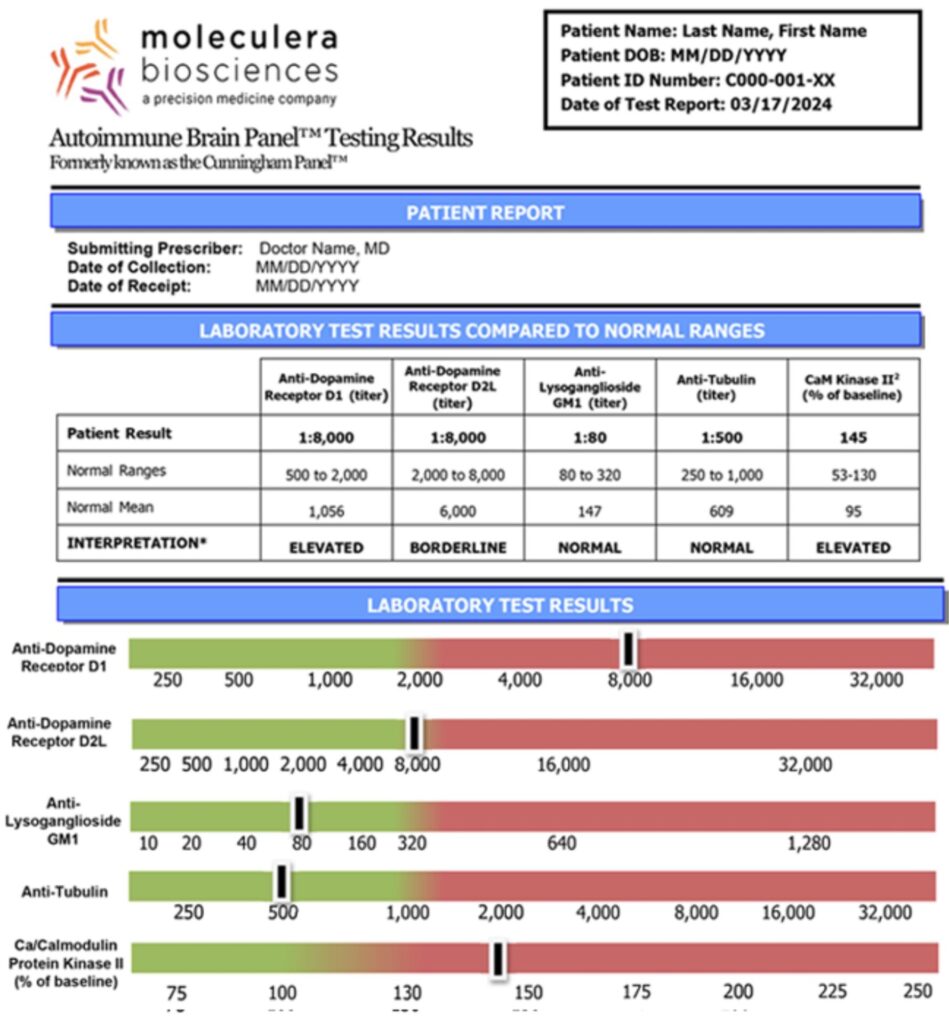PANS and PANDAS Overview
PANS (Pediatric Acute-onset Neuropsychiatric Syndrome) and PANDAS (Pediatric Autoimmune Neuropsychiatric Disorder Associated with Streptococcal infections) are a type of autoimmune disorder that results in basal ganglia encephalitis and are believed to be triggered primarily by infections.
These disorders are characterized by the sudden onset of neurologic and psychiatric symptoms preceded by an infection(s).
Similar to other types of autoimmune encephalitis syndromes, PANS and PANDAS occur when antibodies, produced by an individual’s own immune system in response to an infection or insult, mistakenly attack healthy tissue in the brain.
Autoimmune basal ganglia encephalitis

These autoimmune antibodies bind to or block certain biological components in the basal ganglia, resulting in brain inflammation (encephalitis) and disruption of normal neuronal functioning. This, in turn, can manifest in the onset of psychiatric and/or neurologic symptoms.
Onset of PANS and PANDAS
Identifying PANS/PANDAS is important, as studies indicate that with proper anti-infective and/or immunomodulatory therapy, symptoms can resolve or be dramatically reduced. 3
PANS and PANDAS can be misdiagnosed as psychiatric illness
PANS and PANDAS symptoms may include obsessive-compulsive behaviors, motor/vocal tics, restrictive eating, emotional lability, ADHD-like behaviors (i.e., irritability, impulsivity), aggression, bursts of rage, anxiety, depression, oppositional behaviors, behavioral regression, motor and sensory abnormalities, sleep disturbances, decline in school performance, enuresis or urinary frequency.
Patients with PANS and PANDAS may be misdiagnosed with a psychiatric illness or behavioral disorder, when the symptoms may be the result of a treatable autoimmune dysfunction.
PANS and PANDAS are clinical diagnoses based on a patient’s symptoms, family history, and laboratory results. “It should be noted that PANS is a ‘diagnosis of exclusion’ and that other known medical diseases must be ruled out before a diagnosis of PANS is assigned.” 1

Refrences:
- Kiki Chang, Jennifer Frankovich, Michael Cooperstock, Madeleine W. Cunningham, M. Elizabeth Latimer, Tanya K. Murphy, Mark Pasternack, Margo Thienemann, Kyle Williams, Jolan Walter, Susan E. Swedo, and From the PANS Collaborative Consortium. (2015). “Clinical evaluation of youth with pediatric acute-onset neuropsychiatric syndrome (PANS): recommendations from the 2013 PANS Consensus Conference.” J Child Adolesc Psychopharmacol 25(1): 3-13. http://doi.org/10.1089/cap.2014.0084 https://www.liebertpub.com/doi/full/10.1089/cap.2014.0084
- PANDAS Physicians Network (PPN). https://www.pandasppn.org/what-are-pans-pandas/
- Jennifer Frankovich, Susan Swedo, Tanya Murphy, Russell C. Dale, Dritan Agalliu, Kyle Williams, Michael Daines, Mady Hornig, Harry Chugani, Terence Sanger, Eyal Muscal, Mark Pasternack, Michael Cooperstock, Hayley Gans, Yujuan Zhang, Madeleine Cunningham, Gail Bernstein, Reuven Bromberg, Theresa Willett, Kayla Brown, Bahare Farhadian, Kiki Chang, Daniel Geller, Joseph Hernandez, Janell Sherr, Richard Shaw, Elizabeth Latimer, James Leckman, Margo Thienemann, and PANS/PANDAS Consortium. (2017). “Clinical Management of Pediatric Acute-Onset Neuropsychiatric Syndrome: Part II—Use of Immunomodulatory Therapies.” J Child Adolesc Psychopharmacol 27: 1-16. https://www.liebertpub.com/doi/full/10.1089/cap.2016.0148

